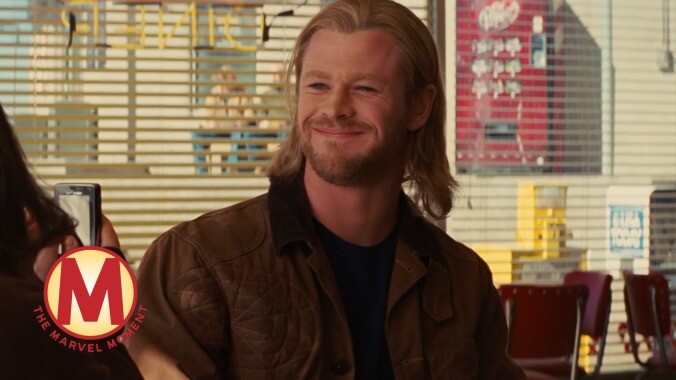Thor demands "another!"—and shows off the comic side Ragnarok would fully embrace


Thor: Ragnarok was a much-needed lightning jolt to an otherwise woefully mild franchise. The film’s tonal shift—specifically, the idea to lean into Thor’s more latent comedic potential—was not only a welcome departure from its predecessors but also a way to make the all-powerful God Of Thunder more accessible. Ragnarok reintroduced us to a version of Thor who contains multitudes: a being who is somehow both impossibly regal and a bit of an exuberant underdog.
But there is a brief moment in the character’s first movie, 2011's Thor, that feels like a precursor to Ragnarok, one that thankfully lessened the distance between this superhero (and maybe Chris Hemsworth, by extension) and the audience. Jane (Natalie Portman), Darcy (Kat Dennings), and Erik (Stellan Skarsgard) take Thor to a small-town diner for breakfast. There, he is introduced to the nectar of necessity that is coffee, and expresses his approval by spiking the mug onto the ground and loudly demanding “another!” Thor is a man far too large for his surroundings (figuratively speaking, though he’s pretty big guy, too), but his infallible charisma makes that easier to stomach. Even seeing him saunter haphazardly into the road with such unnecessary confidence is hilarious (and he does eventually pay for that tendency when he is hit by a car).
From scarfing down what appears to be his second breakfast to goofily smiling for Darcy’s Facebook timeline, those few precious minutes at this quaint diner highlight the sort of fish-out-of-water (or god-out-of-Asgard, if you prefer) element that makes Thor just a little more human. And while the scene is relevant outside of the chuckles (after all, it does bring him a step closer to recovering his beloved Mjölnir), it also signals a sort of potential that inspires audiences to possibly slog through two films (one of which Hemsworth himself admits is “meh”) just for the hope of seeing that spark once more.
The thing is, Thor could have believably remained one-note. He’s handsome, self-assured, wildly powerful, and capable of handling both the fate of the world and his own host of familial issues. Still, none of that calls for much emotional range or any significant depth. Comedy gave Hemsworth a way to explore the flaws of the hammer-wielding god and enough layers to make his superhuman ability almost secondary. It’s what’s made this round-up of characters so engaging over 21 movies and 11 years: the believable notion that we mere mortals could share a few things in common with such extraordinary beings, even if it’s something as minute as not quite knowing how to function in social situations. This particular scene, even in its brevity, will always stand for the larger potential of every Marvel hero: They are more than what they can do for the planet(s), and they (and we) are way better for it.